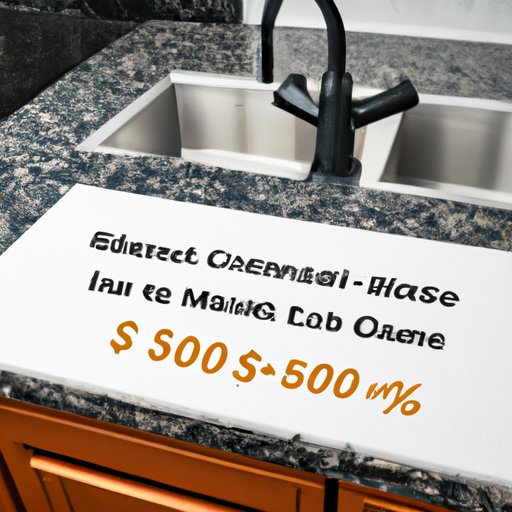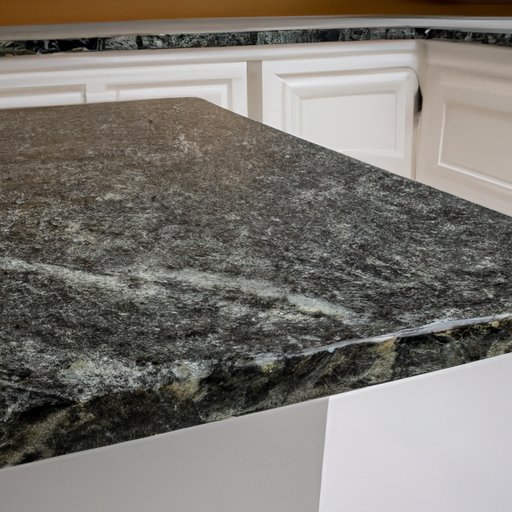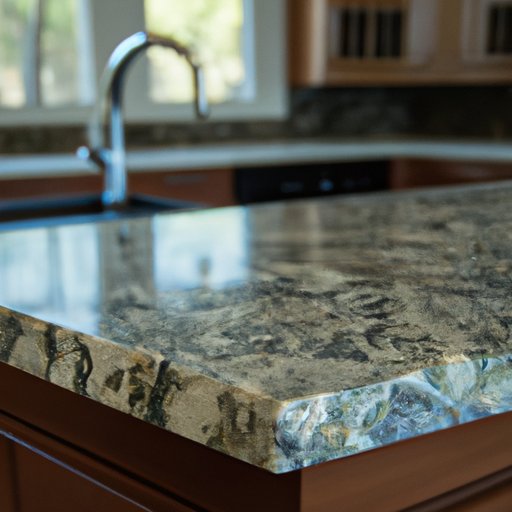
Overview of Granite Countertop Costs
Granite countertops are a luxurious addition to any kitchen or bathroom. They add beauty and value to your home, while also providing a durable and heat-resistant surface. However, with so many different types and styles of granite available, it can be difficult to know how much a granite countertop will cost. In this article, we’ll explore the average cost of granite countertops, as well as the various factors that can impact the price.

Average Cost of Granite Countertops
The cost of a granite countertop can vary greatly depending on the type and quality of granite you choose. On average, you can expect to pay anywhere from $50 to $200 per square foot for a basic grade granite. High-end granite countertops can cost upwards of $400 per square foot. The total cost of your granite countertop will depend on the size and shape of the countertop, as well as the cost of labor and installation.

Factors That Impact the Cost of a Granite Countertop
When shopping for a granite countertop, there are several factors that can affect the final cost. Here are some of the most important elements to consider:
Quality and Type of Granite
The quality and type of granite you choose will have a big impact on the cost of your countertop. Premium granite is usually more expensive than basic grade granite, but it offers greater durability and longevity. Additionally, certain types of granite may be more expensive than others due to their rarity or popularity.
Cost of Labor and Installation
The cost of labor and installation can be a significant factor in the total cost of your granite countertop. Professional installation of a granite countertop typically costs between $50 and $100 per hour, plus materials. If you decide to install your countertop yourself, you could save hundreds of dollars in labor costs.
Size and Shape of Countertop
The size and shape of your countertop can also affect the cost. Smaller countertops require less material and labor, and therefore cost less than larger countertops. Additionally, complex shapes such as curves and angles can increase the cost of fabrication and installation.
Comparing Prices Among Different Types of Granite
When shopping for granite countertops, it’s important to compare prices among different types of granite. There are several factors to consider when comparing prices, such as the type of granite, color, pattern, and finish. Let’s take a closer look at each of these elements.
Granite Slab vs. Tile
Granite slabs are large pieces of granite that are cut directly from the quarry. They offer a seamless look and require fewer seams. Granite tiles, on the other hand, are small pieces of granite that are cut into standard sizes. Granite tiles are generally cheaper than slabs, but they require more seams and may be more difficult to install.
Color, Pattern, and Finish
The color, pattern, and finish of your granite countertop can also affect the cost. Darker colors tend to be more expensive than lighter colors, and complex patterns and finishes may also add to the cost. Additionally, some manufacturers charge extra for custom colors and designs.
Pricing for Each Type of Granite
To better understand the cost of granite countertops, let’s take a look at the average price range for each type of granite. Basic grade granite typically costs between $50 and $75 per square foot. Mid-range granite costs between $75 and $125 per square foot, while high-end granite can cost up to $400 per square foot.
Tips to Help You Get the Best Price on a Granite Countertop
If you’re looking to save money on a granite countertop, there are several tips that can help. Here are a few ideas to keep in mind when shopping for granite:
Shop Around for Different Prices
It’s important to shop around for different prices when looking for a granite countertop. Different suppliers may offer different prices for the same type of granite, so it pays to do your research and compare prices.
Consider Purchasing Granite Remnants
Granite remnants are small pieces of granite that are left over from larger projects. These smaller pieces can be used to create countertops, and they often cost significantly less than full-size slabs. If you’re looking for a more affordable option, consider purchasing granite remnants.
Look Out for Sales and Promotions
Granite suppliers often offer sales and promotions throughout the year. Keep an eye out for discounts and special offers to help you save money on your granite countertop.

DIY Installation vs Professional Installation
Installing a granite countertop can be a daunting task. It’s important to consider whether you should install your countertop yourself or hire a professional. Here are some pros and cons of each option:
Pros and Cons of Each Option
DIY installation can be a great way to save money, but it requires a significant amount of time and effort. Professional installation, on the other hand, is more expensive but can be completed quickly and efficiently. It’s important to weigh the pros and cons of each option before making a decision.
Cost Comparison Between DIY and Professional Installation
DIY installation typically costs between $20 and $30 per hour, plus materials. Professional installation, on the other hand, costs between $50 and $100 per hour, plus materials. Depending on the size and complexity of your countertop, one option may be more cost-effective than the other.
The Benefits of Investing in a Granite Countertop
Granite countertops are a worthwhile investment for any home. Not only do they add beauty and value to your home, they also provide a durable, heat-resistant surface. Here are some of the benefits of investing in a granite countertop:
Durability and Longevity
Granite is incredibly durable and resistant to scratches and chips. It has a long lifespan and can last for many years with proper care and maintenance.
Heat-Resistant Surface
Granite is a natural heat-resistant material, making it ideal for kitchen countertops. Hot pots and pans won’t damage the surface, and spills can be wiped up quickly and easily.
Beauty and Value-Adding Potential
Granite countertops add beauty and value to any home. They can instantly upgrade the look and feel of your kitchen or bathroom, and they can even increase the resale value of your home.
Conclusion
Granite countertops can be an expensive investment, but they offer a number of benefits that make them worth the cost. When shopping for a granite countertop, it’s important to consider the various factors that can affect the cost, such as quality, size, shape, installation, and type of granite. Comparing prices among different types of granite, shopping around for different prices, and looking out for sales and promotions can all help you get the best price on your granite countertop.
(Note: Is this article not meeting your expectations? Do you have knowledge or insights to share? Unlock new opportunities and expand your reach by joining our authors team. Click Registration to join us and share your expertise with our readers.)
